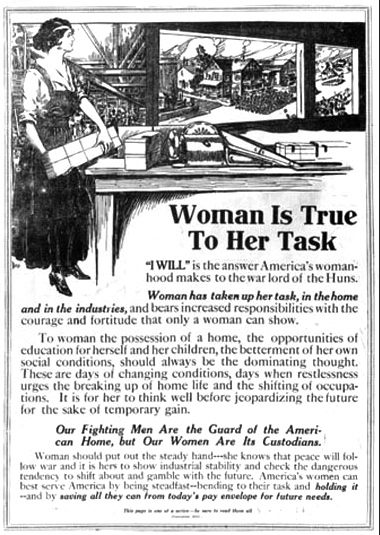Yesterday, in honor of May Day, Anna North at Buzzfeed Shift posted a set of photos on the history of women in the (mostly U.S.-based) labor movement. One that I found particularly interesting was this 1918 poster urging women to be both thrifty and productive industrial workers as they play their role in winning World War I:
Note how patriotism is clearly connected to the idea of women having more opportunities:
To woman, the possession of a home, the opportunities of education for herself and her children, the betterment of her own social conditions, should always be the dominating thought.
But the poster simultaneously warns them against using their freedom for their own pleasure at the expense of the nation:
…restlessness urges the breaking up of home life and the shifting of occupations. It is for her to think well before jeopardizing the future for the sake of temporary gain…it is hers to show industrial stability and check the dangerous tendency to shift about and gamble with the future. America’s women can best serve American by being steadfast — bending to their task and holding it — and by saving all they can from today’s pay envelope for future needs.
So women are encouraged to think of themselves as empowered workers, with increased opportunities available to them, but only to the degree that this makes them reliable, productive workers and thrifty citizens, drawing on ideas of women’s special role in the home. Just as women are the “custodians” of their homes, they must also ensure “industrial stability” by sticking with their jobs for the good of the nation — a choice which might, of course, conflict with a woman’s efforts to improve her own or her family’s social conditions by, say, taking a job that pays more or has better working conditions. The poster encourages women to consider their opportunities, but ties those opportunities tightly to the common good of the nation and the family, ultimately warning women against too much pursuit of individual self-interest.


Comments 15
Patti — May 2, 2012
I think this is the beginning of when women were expected to "do it all". They had to both keep house and work full-time and be happy about it!
Alex Odell — May 2, 2012
Yes, despite the increased opportunities for women described in this ad, women are still expected to be the all-sacrificing martyrs, who always do things only for their families, never for themselves or their own betterment. Reminds me so much of my Mormon sunday school classes...... x/
hopeless shade — May 2, 2012
Articles! Definite or indefinite, I don't care. A woman. The woman. This woman. Augh.
Intrestingproblems — May 2, 2012
I personally believe that woman are the center piece of a family the stronghold of it. This might be against the woman who never want to have children or want to get married because our society deems that as not being "happy". Kudos to those successful woman who actually are happy without having children or married. The fact of life is that some people are either for having a family and putting their dreams and goals on hold or just be happy pursuing their life goals.
molochmachine — May 3, 2012
This reading is interesting, but it seems to be reproaching people back then for not sharing today's ideological frameworks. Furthermore, while the way this poster frames femininity is indeed antiquated, is it really that bad of a request to suggest that people save money rather than spend it on luxuries - especially in the current political climate? I seem to recall many other ads -targeted at both men and women- that encouraged saving money during wartime.
While I get that the author is trying to point out a systematic problem, It seems awfully petty and historically myopic to focus on this aspect of the poster as a nexus of ideological patriarchy, when it is only advocating the same level of self-sacrifice that was being demanded of everyone at the time.